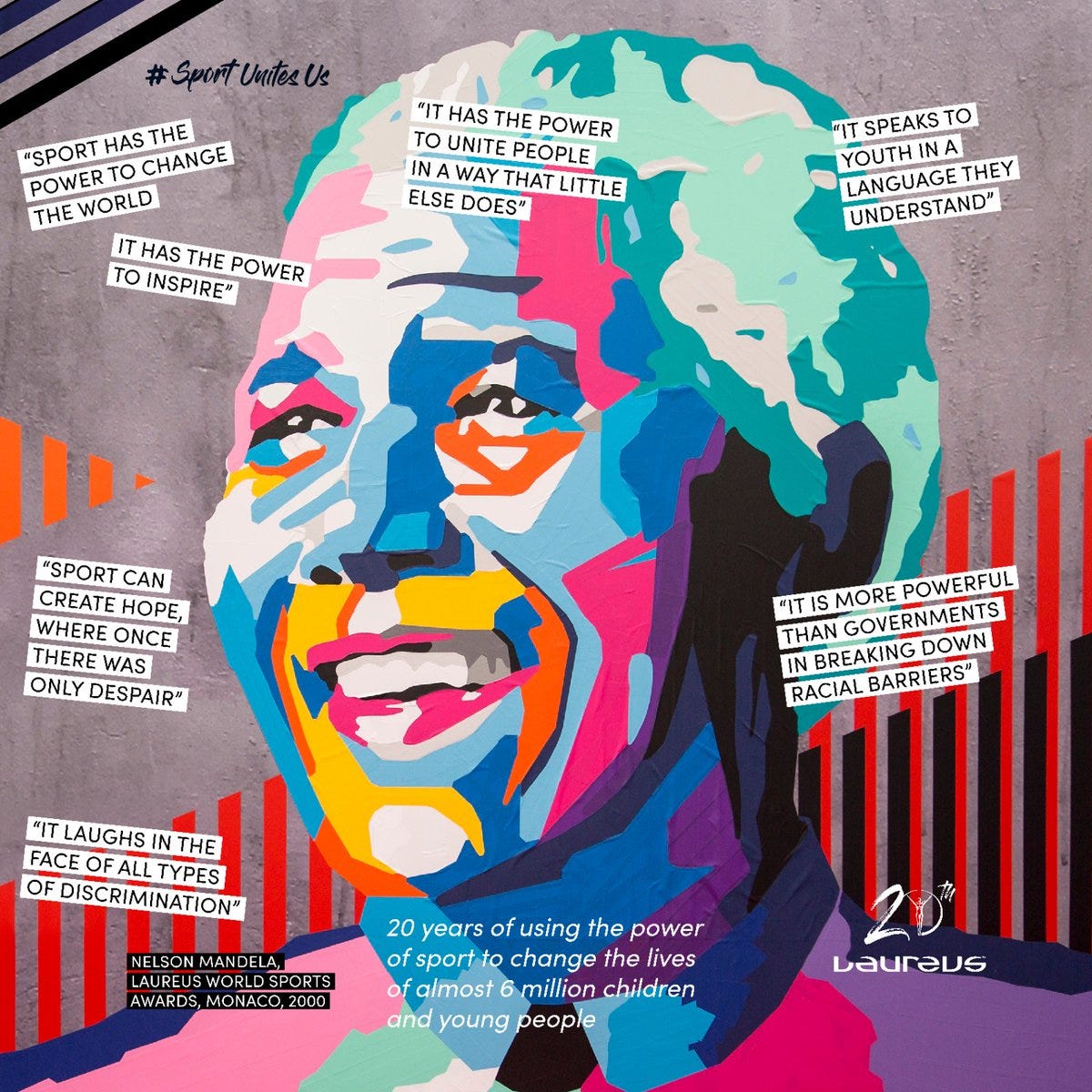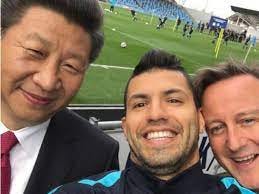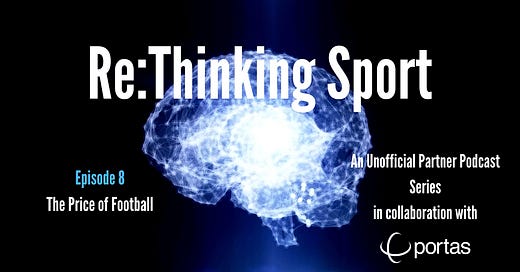The limits of sport; Sportswashing doesn't work, pass it on; Price of Football podcast; John Amaechi on fire; MLS bulls; Purpose watch; Regulate me; Vote Anstiss
The newsletter of the podcast
Join the thousands of people who subscribe to Unofficial Partner.
We publish two podcasts each week, on Tuesday and Friday.
These are deep conversations with smart people from inside and outside sport.
This newsletter is our way of picking up the threads, and is published every Thursday.
Our entire back catalogue of 200 sports business conversations are available free of charge here.
Each pod is available by searching for ‘Unofficial Partner’ on Apple, Spotify, Google, Stitcher and every podcast app.
If you’re interested in collaborating with Unofficial Partner to create one-off podcasts or series, you can reach us by replying to this email.
We don’t talk about the limits of sport very often
John Amaechi is on blistering form in tomorrow’s podcast.
Amaechi: ‘Sport has two problems. It over promises and under delivers’
He’s right.
The industry is very fond of referencing the power of sport.
Whatever the problem, sport is the answer.
This has become a catch-all that can be applied to anything, from the trivial - selling beer and mobile phone networks - to the more ambitious - societal change, good causes, cleaning the reputation of dodgy dictatorships.
Often, the power of sport vendor recruits Nelson Mandela to their cause, shamelessly co-opting his 2000 Laureus speech for their own ends:

So, to question the power of sport is industry heresy.
But the point is that the over claims get in the way of real progress. They muddy the waters.
Of course, sport can be an extremely effective change agent.
And it’s important to recognise the limits. They put a shape to the promise.
The limits of sport pt 1: The inspiration story and Tanni Grey Thompson’s ‘false hopes’ speech
Baroness Tanni Grey Thompson made an important speech last week, in front of an audience including Nadine Dorries MP, the new culture minister.
“Far too often the debate on elite sport, inspiration and population in activity have been conflated. This conflation is to the detriment of everyone and means our sector has fallen short of playing its fullest role in society. Because it has created false hopes on matters such as ‘legacy’ from major sporting moments.
See previous: I’m over gold medals, except Paralympic medals.
Linked: Sport England’s Active Lives Survey is out today.
There’s a big problem getting kids back to sport post-pandemic and sports bodies can only do so much.
Tim Hollingsworth, CEO of Sport England summarised the need, via WhatsUP:
Sport/Leisure as a statutory service for LAs.
Ofsted statutory measurement of childrens health and well-being in schools
Effective resourcing of social prescribing in primary healthcare.
Three central govt policy changes that would change the landscape
Former UK Athletics chair Ed Warner wants to give sports vouchers to kids as a nudge.
A £50 voucher for all 11-16 year olds that can be redeemed to join a club, go on a course or camp, enter competitions, swim in a pool or use a leisure centre. A nudge for life.
Former Sport England chair Nic Bitel doesn’t care for the idea, via WhatsUP:
Lord Carter looked at the idea of activity vouchers over 15 years ago and rejected them on the basis that the main effect would be to subsidise the wealthy and middle classes. What is needed is a massive injection of funding into local authorities for leisure and sport which has lost over £0.8bn funding a year. Also make sport and recreation a statutory service like libraries are.
The limits of sport pt 2: I’m not sure sportswashing works like dictators think it does.
The power of sport argument suggests that a Bad Regime’s reputation can be cleansed by buying a football club, like dirty money running through a Knightsbridge estate agent.
It doesn’t.
Note how the coverage of the Newcastle takeover comes with the phrase ‘Saudi human rights abuses’ attached, like a naming rights deal.
The money laundering analogy
Sportswashing is an adaptation of the money laundering story (dirty to clean).
McMafia by Misha Glenny (the book, not the TV series) revealed the process of industrialised money laundering that followed the fall of communism, aided by the usual cast of well heeled and amoral bankers and advisers.
But stories are far harder to control than money.
This is because there are two parts to a story.
The one that is told and the one that’s heard.
This was nicely summarised in Jonathan Gottschall’s excellent book, The Storytelling Animal:
The writer is not the all powerful architect of our reading experience. The writer guides the way we imagine but does not determine it...A writer lays down the words, but they are inert. They need a catalyst to come to life. The catalyst is the reader’s imagination.
The dictator’s money can buy a platform. But it doesn’t buy the story.
So, given sportswashing probably doesn’t work, why do they persist in doing it?
The obvious reason: football clubs are not a soft power tool.
They are not a vehicle for the normalisation of terror.
These are both classic power of sport over claims.
I suspect the embarrassing truth is that Newcastle Utd, PSG, Man City…are toys, bought by indulged children while their dads are busy elsewhere, buying up critical supply chains and arranging quasi-religious wars. This depressing thought is dressed up as geopolitical mind games to save everyone’s face.
Linked: Do you remember when people lost their shit over this pic.

The future shape (and price) of football
This week’s podcast asked Kieran Maguire and Nic Coward to bring together some of the threads of the ReThinking Sport series, our episodic collaboration with Portas Consulting.
Two main threads:
Rick Parry on Project Big Picture, what he wanted to happen v how it was perceived when it was leaked. The ‘evil’ of parachute payments, wonky incentives through the football league pyramid and the what the threat/promise of government intervention - aka an external regulator for football - would probably look like in reality.
Paul Conway on multi club ownership, how this impacts on integrity of leagues, talent pathways and as a Brexit backdoor, or as a slippery slope to Premier League B teams in the Chelsea-Vitesse Arnhem style.
To hear all eight podcasts in the series, just type ‘Portas’ in the search box:
The MLS as Super League argument
If you can look past the obvious self promotion, I thought this was a heck of a thread from Roger, building on Nic and Kieran’s conversation.


It prompted a view from California, aka Facebook’s Peter Hutton, via WhatsUP:
Fascinating big picture from Roger - and particularly for me his MLS ‘option’.
Watching San Jose Earthquakes on a regular basis doesn’t make me bullish (it’s no Pride Park) - but no question that the ‘soccer’ numbers in the US are increasing rapidly. Top MLS franchise valuation now at 860 million, average valuation at 550 million usd and rising all the time. That’s a lot of money betting on growth.
The demographics are moving towards ‘soccer’ with a younger fanbase than the big 3 leagues and the growing Hispanic population. Also huge youth programmes - I reckon 20 percent of the kids (boys and girls) in my 13 year old son’s year are part of organised soccer training three times a week.
The womens team are clearly leading the charge in terms of ‘breakout stars’ with Rapinoe still very visible but the men’s team have some great young talent too (Pulisic, Reyna etc). The World Cup here in 2026 is well timed for their ‘golden generation’.
And into all this comes the current Premier League tender in the US. Very aggressive rises in value for the Italian, German and Spanish leagues in the last year driven by the need for content to grow OTT platforms (and no-one’s putting the NFL exclusively on OTT any time soon).
Meanwhile Fox have just won the Euros from Espn in a very competitive bid.
Timing looks great for the Premier League - and in Josh Smith and Miriam Sherlock they have two top execs in the country to run the process. Incumbent NBC’s Sky ownership should help them but they regularly put high profile games on their limited distribution Peacock OTT network to the annoyance of the clubs. Espn’s head Jimmy Pitaro just described the Premier League as great ‘DTC’ product last week - which may not be the message the American club owners want to hear. Going to be a great month of rumour with NBC v ESPN v Fox v CBS v Turner/Discovery (and maybe supporting numbers from Fubo and others).
I appreciate that some of us have been here before with talk of US ‘soccer’ growth - but Roger’s right to include the USA influence in the ongoing power game.
Linked: SBJ on the US market for European football rights.
Vote Anstiss
You know it makes sense. Vote early and often.


#PurposeWatch
This is a really nuanced unpicking of the IPA’s recent report in to the effectiveness of brand purpose advertising.
Is brand purpose all it’s cracked up to be?
Enjoy the Unofficial Partner newsletter? Tell your friends
Subscribe to the Unofficial Partner podcast.
Help us game the Substack algorithm by liking this newsletter and spread the word on social media.
Follow @RichardGillis1 and @PaulPingles (aka the ill-judged Twitter handle of Sean Singleton, the UP co-founder).
Read over 100 gushing five star reviews for UP on Apple Podcasts - click the link to add yours.







